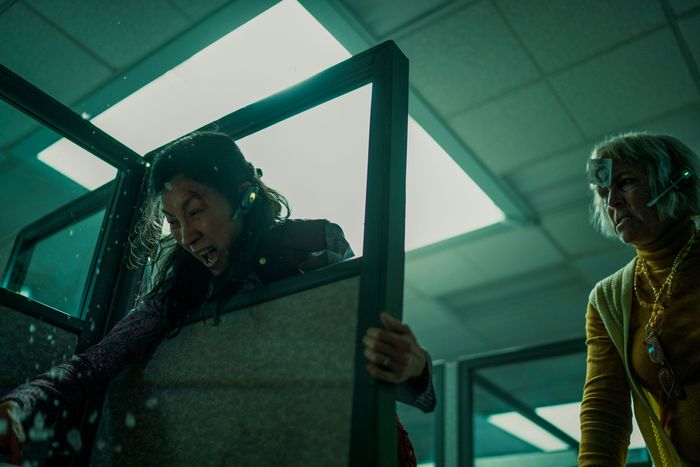
Jobu Tapaki (Stephanie Hsu), the universe-hopping villain of Everything Everywhere All at Once, wears ensembles of escalating outrageousness over the course of the film: a matching plaid cape trench and visor set, a stylized golfing costume, an Elvis-esque rhinestoned jumpsuit. Omnipotence may saddle you with a sense of crushing nihilism, but it also nets you a fabulous wardrobe, which is why, when Jobu shows off the all-consuming object of annihilation she’s built, she does it in a futuristic riff on an elaborate Elizabethan gown. Anything is possible in Everything Everywhere All at Once, a work whose dazzling, dizzying qualities can be summed up in every one of Jobu’s impossible outfit changes. And yet the costuming choice that best explains why the film is such a knockout is a knit jacket that its heroine, Evelyn Wang (Michelle Yeoh), wears during the Chinese New Year party that she and her husband, Waymond (Ke Huy Quan), are throwing. It’s a perfect article of pragmatic Chinese matron fashion, selected with affection and humor — red, with floral patterns down the sleeves, and on the back, as a decorative non sequitur, it reads, “PUNK.”
Evelyn is not a punk. She’s a harried small-business owner in Simi Valley who’s having trouble paying her taxes. Around a decade ago, a now-defunct Tumblr called Accidental Chinese Hipsters used to document items like Evelyn’s “PUNK” sweater as evidence of the overlap between semi-ironic scenesterism and Chinatown granny styling. The joke was that the cool kids could only dream of matching the oblivious swagger of an elderly Chinese man in a sweater vest and a night-market beanie emblazoned with “Die Yuppie Scum.” But underscoring the project was an understanding of how unremarked upon its subjects otherwise were, considered invisible even in their ubiquity in laboring to keep the world running.
To note that Evelyn is not the kind of woman whose interior landscape gets explored onscreen is an understatement. Evelyn has all but merged into the backdrop of the laundromat that she and Waymond own, live above, and are in danger of losing, offering herself up on the altar of work out of habit more than anything. Her marriage to the happy-go-lucky Waymond is on the rocks. Her relationship with her depressive daughter Joy, whose queerness she can begrudgingly tolerate but whose professional inertia she can’t, is desperately estranged. Her disapproving father (James Hong) has arrived from China for a visit. The Wangs are also in the process of being audited by the surly Deirdre (Jamie Lee Curtis). On top of all of that, Evelyn keeps getting contacted by forces from another reality who claim she’s the only one who can save the universe.
Everything Everywhere All at Once is the second feature from the directing duo of Dan Kwan and Daniel Scheinert, a.k.a. Daniels, who started in music videos and inventive shorts before graduating to the 2016 film Swiss Army Man. That inventive, juvenile, and ultimately tiresome dramedy, which starred Paul Dano as a marooned, suicidal man and Daniel Radcliffe as the farting corpse he rides across the ocean back to civilization, really showed off the pair’s strengths and weaknesses. They strive for a mix of the profane and the transcendent, and also like to follow a dumb joke way past its logical conclusion and back around to a (hopefully) moving conclusion. They may have retained their fondness for things getting stuck up butts, but they’ve grown over the years, and Everything Everywhere All at Once is something approaching a maximalist masterpiece. It’s also about 15 to 20 percent more movie than it needs to be, and gets bogged down by its overabundance of ideas in the middle. The payoffs for Evelyn misremembering the concept of Ratatouille, for a universe in which everyone has hot-dog fingers, and the sentient-rock conversation would be more effective if one of them were snipped.
That said, it’s a movie with an extended bit about a misremembered Ratatouille, with a hot-dog-fingers reality, and with talking rocks. Evelyn learns, with the help of a tough-guy Waymond from another reality, to get in touch with the many other Evelyns across the multiverse, borrowing their skills as martial-arts movie stars, sign spinners, singers, and Benihana chefs in an effort to defeat Jobu Tapaki — only to realize that Jobu Tapaki is a dark version of Joy who was broken by her mother’s pressures to succeed. Snapping in bursts from universe to universe, Everything Everywhere All at Once constantly courts sensory overload, lining up the edges of surreal domestic scenes and wuxia fights and a Wong Kar-wai street-scene homage and the windowless confines of the IRS, and moving between them, sometimes too quickly to register. But for all its own garbled mythology, which it doesn’t take especially seriously, always at its core are the Wangs and the hurt they keep doing to one another in the name of love.
March has been a big month for movies about mothers, daughters, and diasporic Asian angst. Turning Red pitted a 13-year-old Chinese Canadian girl against the controlling affection of her mother, with a side of boy bands and magical pandas. Umma went for the horror treatment, with Sandra Oh as a Korean American single mom harboring secrets about the past, though it actually landed in the realm of camp. Everything Everywhere All at Once is the most sprawling of them all, a story of disappointment and miscommunication and the burden of expectations across generations, and of the three, it’s the only one to center the immigrant parent instead of looking on from the point of view of their kid. The film extends an empathy toward Evelyn that’s deeply moving and long in coming, giving consideration to her in all her shortcomings — her impatience, her callousness with those close to her, her inability to finish anything, her doubts — and then finding in her generosity and grace as well.
It’s a euphoric showcase for Yeoh, bringing the superstar down to earth and then flinging her back into space, but it’s also a poignant return to the screen for former child star Quan, who as Waymond is the tender heart of the film, as well as someone who can use a fanny pack as a rope dart in combat. Everything Everywhere All at Once may be a kaleidoscopic fantasy battle across space, time, genres, and emotions, but it’s an incredibly moving family drama first. Maybe there’s something punk about it after all.
More Movie Reviews
- How Do You Know When the World Is Over?
- In Search of a More Welcoming Reality
- The Fall Guy Is a Funny, Romantic, Stunt-Filled Delight





